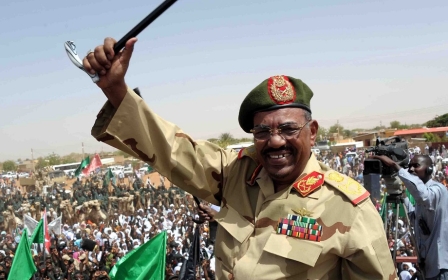Sudan protest leaders, army rulers plan more talks on power transfer

Protest leaders and Sudan's military rulers will hold more talks over transferring power to a civilian administration after negotiations ended on Saturday with thousands of demonstrators still massed outside army headquarters.
The talks were held on the eve of the protest leaders' planned announcement of a ruling civilian council they say will replace the country's current ruling military body.
"We clarified our main demand, which is the transfer of power to civilian authorities," Siddiq Yousef, a senior member of the Alliance for Freedom and Change, the umbrella group leading the protest movement, told state television after Saturday's round ended.
"We agreed to continue negotiations to reach a solution that satisfies both the sides, so that the transfer of power will happen in a peaceful way."
Stay informed with MEE's newsletters
Sign up to get the latest alerts, insights and analysis, starting with Turkey Unpacked
He did not confirm whether protest leaders will go ahead with their planned unveiling of a ruling civilian council on Sunday.
Still, another senior leader of the movement had indicated earlier that postponing Sunday's announcement was possible.
"If they (the military council) are willing to negotiate, then there is a chance that tomorrow's (Sunday's) announcement could be postponed," Ahmed al-Rabia, of the Sudanese Professionals Association (SPA), the group that initially launched the campaign to oust veteran leader Omar al-Bashir in December, told AFP.
Since Bashir was toppled 11 April by the army, Sudan has been ruled by a 10-member military council that has so far resisted calls to transfer power to a civilian body.

Thousands of protesters camped outside the army headquarters in central Khartoum have now turned their attention to the military rulers, demanding they hand over power swiftly to a civilian body.
"What we want from them is a timetable to hand over power, so things don't drag," said Rabia.
He said mounting pressure from the street and from the international community was expected to make the military council cede power in "two to three weeks".
"We are done with the easy part (toppling Bashir). We want to remove the entire regime," Rabia said.
Protest leaders say the civilian council would form a transitional government to rule Sudan for a four-year term, followed by elections.
"All we hope for is to be ruled by civilians and get rid of the military rule," protester Ehsan Abdallah, said outside the army complex late Saturday.
Similar views were echoed by many as demonstrators outside the complex kept singing, dancing and chanting revolutionary songs and slogans as darkness fell.
"The SPA should announce a civilian council tomorrow and later a government and a legislative body representing all Sudanese people including women," said demonstrator Rabah Sadeq, 51.
The military council has made some concessions to the protesters by agreeing to demands such as detaining Bashir and releasing many political detainees and protesters.
On Saturday, Sudan's new prosecutor general lifted the immunity of security agents allegedly involved in the death of a detainee, state media reported.
Sudanese authorities also arrested several members of the former ruling party of Bashir, an official of Bashir's National Congress Party told Reuters on Saturday.
Hassan Bashir, a professor of political science at the University of Neelain, told Reuters the measures against Bashir are intended as a message to other figures associated with his rule that they are not above the law.
"The trial is a step that the military council wants to take to satisfy the protesters by presenting al-Bashir for trial," he said.
Prominent Sudanese journalist Khalid Tijani said the protest leaders were in a "tough situation" over finalising the civilian council.
"If they are not ready with the names, it will send a negative signal, and this will not be to the benefit of the revolution," said Tijani, editor of economic weekly Elaff.
Calls for handing over power to a civilian body have also come from the African Union (AU) and the United States.
On 15 April, the 55-member AU threatened to suspend Sudan's membership by the end of the month if the military council failed to hand over power to civilians.
"A military-led transition would be completely contrary to the aspirations of the people of Sudan," the AU said.
The United States was dispatching a deputy assistant secretary of state for east African affairs, Makila James, to Khartoum for an on-the-ground assessment of the situation.
Washington's short-term goal is to "get the military folks out of centre-stage," a senior US official said on condition of anonymity earlier this week.
The official called for transitional authorities to prepare the way for "a truly democratic government that will reflect the will of the Sudanese people".
Middle East Eye delivers independent and unrivalled coverage and analysis of the Middle East, North Africa and beyond. To learn more about republishing this content and the associated fees, please fill out this form. More about MEE can be found here.





